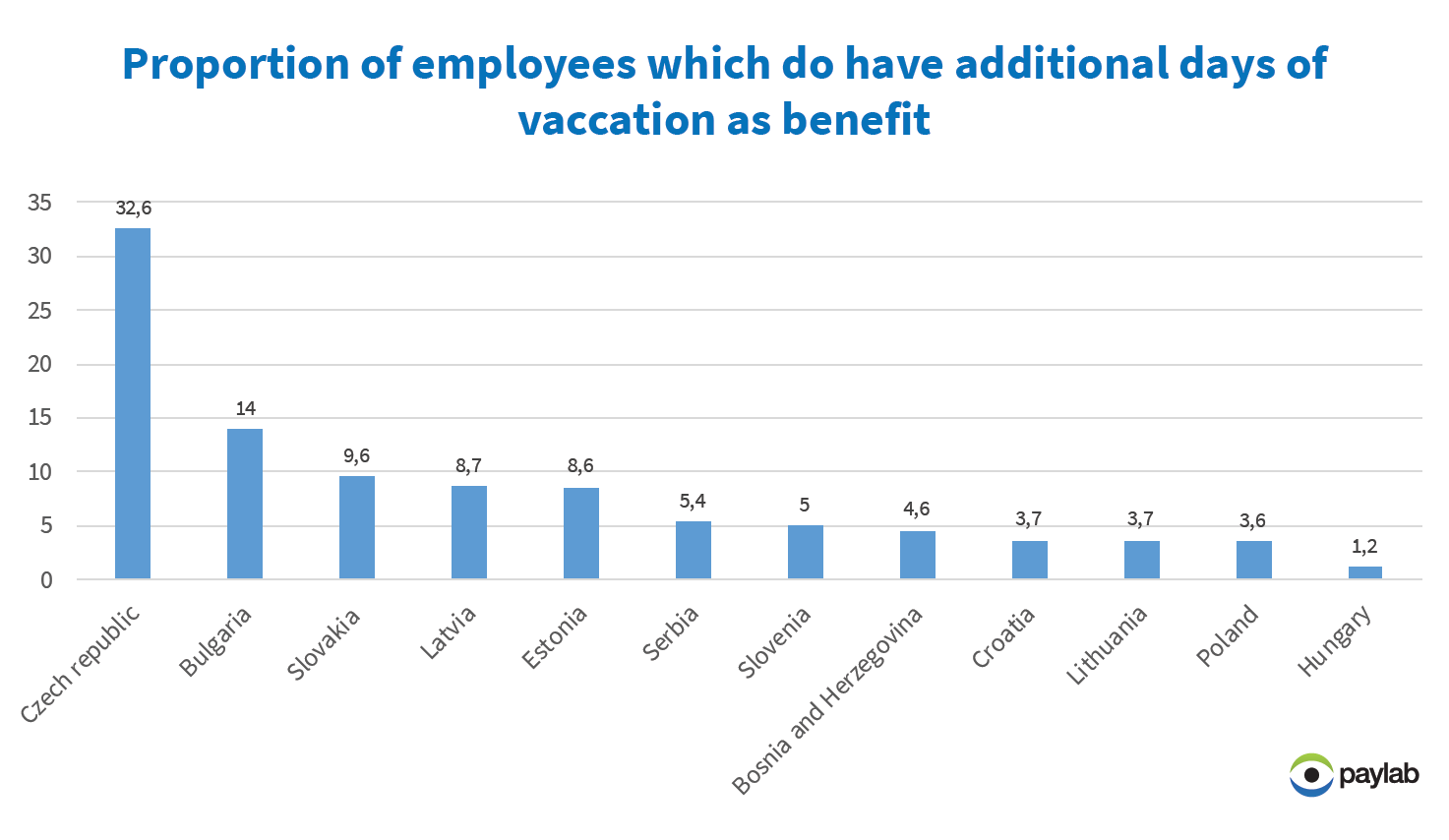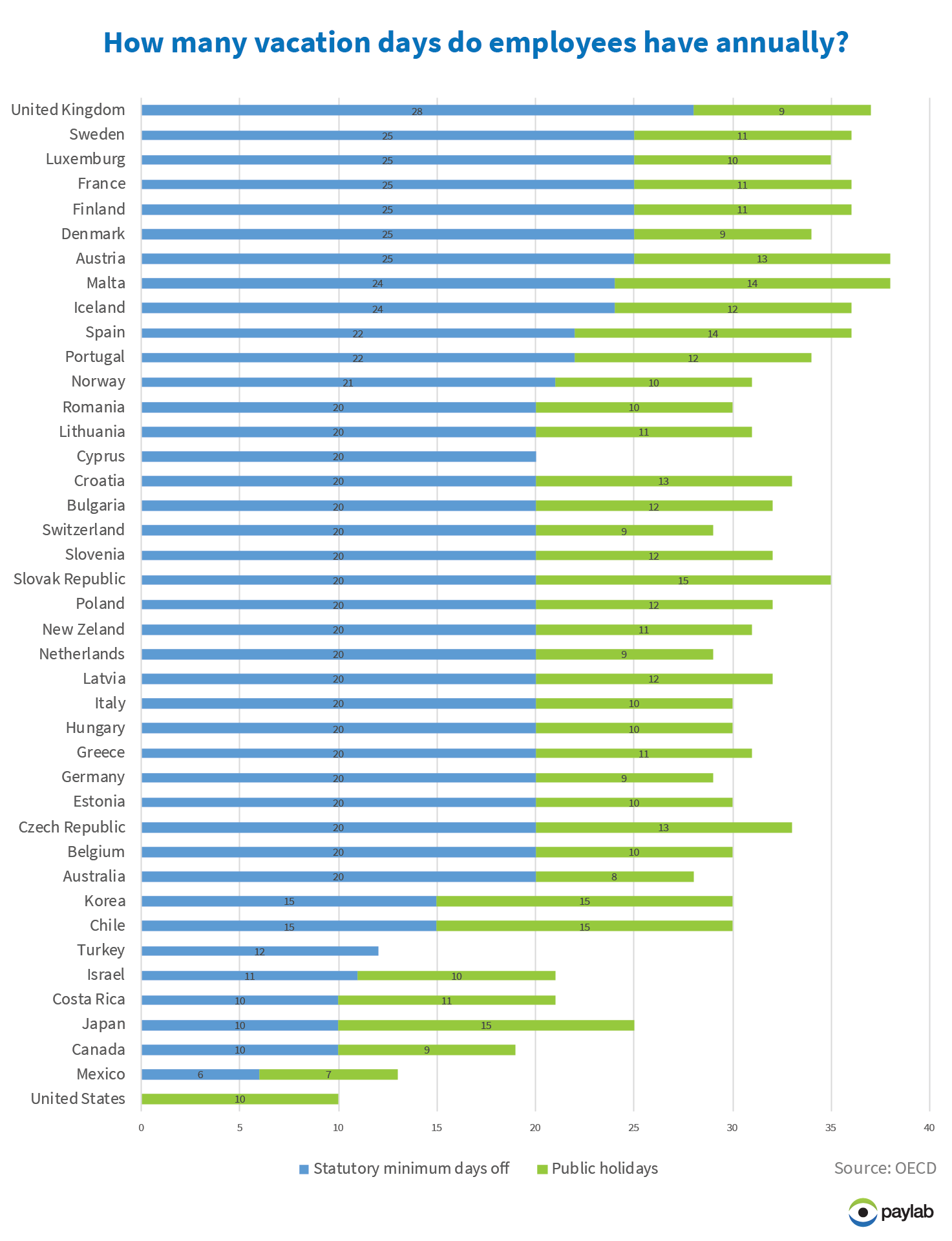18 June 2018

Time is money and that goes double for the company benefit of extra holiday time. In other words, a company is willing to provide an employee with more time off that is included their salary. More time off during the calendar year is currently one of the most attractive modern company benefits. A Paylab.com survey found that its attractiveness, together with flexible working hours, is on the rise. How many employees do receive 1 to 5 extra days off over and above the legally mandated holiday time? In some countries, however, going on holiday is a true luxury.
Employees appreciate this benefit more in countries where there are fewer days off or in countries where fewer national holidays fall on business days. Some companies offer extra time off on employees' birthdays, as an example. Giving loyal employees who have remained with the company for an extended period of time more days off is a very attractive form of motivation.
Seeing an opportunity to "unplug" can be very appealing to employees in the face of a crush of work responsibilities. Some use the free time for themselves and their hobbies, while others focus on family and friends, continuing their education or home improvements.
The ability to better cover school holiday time is attractive to parents with young children, while those who travel have the opportunity to plan a longer holiday and to see and experience more on individual trips.
The prevalence of extra holiday time varies from country to country. Among the surveyed countries, it is most common in the Czech Republic, where up to 33 per cent of employees report this specific benefit.

How is holiday time used in individual countries?
Across Europe, the general rule is that employees are entitled to roughly 20 days of paid holiday time from employers under the law. Primarily internal employees working for their current employer for more than one year in a full time position 5 days a week are eligible. Time off in some countries is handled within collective bargaining, and certain professions have even more time off. In countries such as Hungary and Slovakia, the older the employee, the more holiday time they have. Extra holiday time is typically provided to civil servants within their package of social benefits.
Europeans enjoy the greatest luxury in this direction, with Great Britain at the head and where the minimum statutory limit for paid holidays is the highest (28 days). They are followed by Austria, Denmark, Finland, France, Luxembourg and Sweden, where the statutory minimum is 25 days off. Conversely, countries such as Turkey, Israel, Mexico, Japan and Canada have much stricter conditions and only offer a fraction of paid holiday time under the law of that offered in Europe.
Many European countries offer extra time off over and above the legally mandated holiday time for national holidays, where employers are often forced to pay for holiday time off. The most national holidays in Europe are in Slovakia (15), Malta (14), Spain (14), Czech Republic (13), Austria (13) and Croatia (13).
Relaxation in the form of paid holiday time is a true luxury in the United States of America, where employers have no obligation to pay employees any holiday time. It is completely up to the employer to determine the number of paid days off to give to their employees and to what extent. Despite this, many companies provide personal time off (PTO), which is a policy in some employee handbooks that provides a bank of hours in which the employer pools sick days, vacation days, and personal days that it allows employees to use as the need or desire arises. Basically, that which employees are entitled to in Europe under the law is communicated by employers in the US as a company benefit.

Perhaps because there is a business - centric attitude in the US, this is the reason why some companies in the United States promote a culture of unlimited vacation time, where employees in some companies, such as Netflix, can take time off any time they need as long as their work tasks are done on time and at the required quality. The main idea is to foster in employees an ownership mentality where they think about what's best for themselves and what's best for the company.
In many countries, such as Great Britain, the practice of blocking holidays, where an employer offers paid time off but employees must use it during a specifically defined period during company-wide holidays, is commonplace.
In general it applies that rested employees benefit the companies themselves as it helps them to eliminate stress and mistakes in the workplace. Holiday time is also another interesting addition to the employee remuneration system.
About Paylab
Paylab.com was set up in September 2015 and operates 16 local salary portals utilising identical data acquisition methodology, mostly in the Central Southern and Northern Europe. It also provides people from around the globe with the opportunity to compare their salary at Paylab.com.
Paylab analysed salary data collected in the recent 12 months through localised salary portals: Bosnia and Herzegovina - Plata.ba, the Czech Republic - Platy.cz, Croatia - MojaPlaca.hr, Estonia - Palgad.ee, Finland - Palkkadata.fi, Serbia - InfoPlate.rs, Slovakia - Platy.sk, Hungary - Fizetesek.hu, Poland - PensjoMetr.pl, Slovenia - Placa.si, Lithuania - Manoalga.lt, Latvia - Algas.lv, Bulgaria - Zaplatomer.bg

